#Essay editing
Explore tagged Tumblr posts
Text
Essay Editing & Writing Services~!
Need an Essay That’s Twice as Good? Choose DoubleWritten!
Stressed about that essay or assignment? Let DoubleWritten take the load off your shoulders! I deliver expertly crafted essays and offer meticulous editing that polishes your work to perfection. From brainstorming to fine-tuning, I’ve got you covered.
✍️ What I Offer:
Custom essays written to your exact requirements
Detailed editing and feedback to elevate your work
Fast turnaround and guaranteed quality
Get top grades with writing that stands out – Double the expertise, Double the results. ✨
🤑 What Does it Cost?
Editing: $15 flat rate. No matter how long your essay is or how much editing needs to be completed, your total is $15 flat. No fees, taxes, or tips needed.
Writing From Scratch: $25 flat. Need a 25 page essay on the Grand Canyon or a 10 page essay on Chinese history? I've got you covered for $25 flat. Just like with editing, there are no fees, taxes, or tips!
🗒️ Important Notes
Payments are due up front, no exceptions.
You should submit your request 7 days before your deadline! I will try to have it done in 24-72 hours after a request has been made, but I do have personal obligations to reach on the side.
No refunds are issued. I have provided samples of my work on the Notion linked below alongside my class grades: I submit high quality work and will not refund once I have received payment.
Absolutely NO AI is used in the construction of my essays. Everything is written directly by hand after doing research and gathering all relevant materials as it relates to your topic. You will NOT have to worry about your paper being flagged for AI or plagiarism. I've got you covered 100% of the way.
I will never ask for your log-in information for any site or application. All of our communication will be through email and no passwords will ever need to be exchanged.
ℹ️ What Do I Need from You?
Your exact topic with as much detail as possible. What kind of essay is this? What is the topic?
Exact requirements as outlined by your teacher, professor, or rubric. How many pages? Word limits? Citing requirements?
A copy of your current essay for the sake of editing.
Editing requests. Am I rewriting your work? Am I fixing the grammar? What do you need me to do to make your essay look better?
Deadline for submission.
📩 Ready to get an essay edited or written?
Please check out my Notion to read over the guidelines for ordering a freshly written essay or receiving an edit on t he essay you've started on!
📧 To Request my Service:
Check the Notion and navigate to the "ordering an essay" or "ordering essay editing" pages to ensure you gather all of the information I will need from you.
Email me at [email protected] with ALL information outlined above and on the Notion.
Make your payment.
💬 Questions and Concerns
If you have any questions or concerns about using my services, please do not hesitate to reach out via email ([email protected]) to get all questions answered or concerns addressed.
I can be reached 7 out of 7 days a week, between the hours of 9:30AM and 12AM.
#homework help#essay writing#essay editing#writing#writing help#homework assistance#do my homework#do my assignment#studyblr#homeworkblr
1 note
·
View note
Text
Learn special methods and strategies for editing and proofreading your essay. Discover insider secrets that will enhance your professional editing and proofreading skills. Gain expertise to polish your essay like a seasoned professional. Your essay highlights the tips and techniques needed to perfect the game at the highest level.
#strategies for editing and proofreading your essay#English Assignment help#online english assigment help#assignment experts#online assignment experts#essay writing#essay writing help#Essay editing#Essay wrting help#Online Essay Help#Assignment Expert help
0 notes
Text
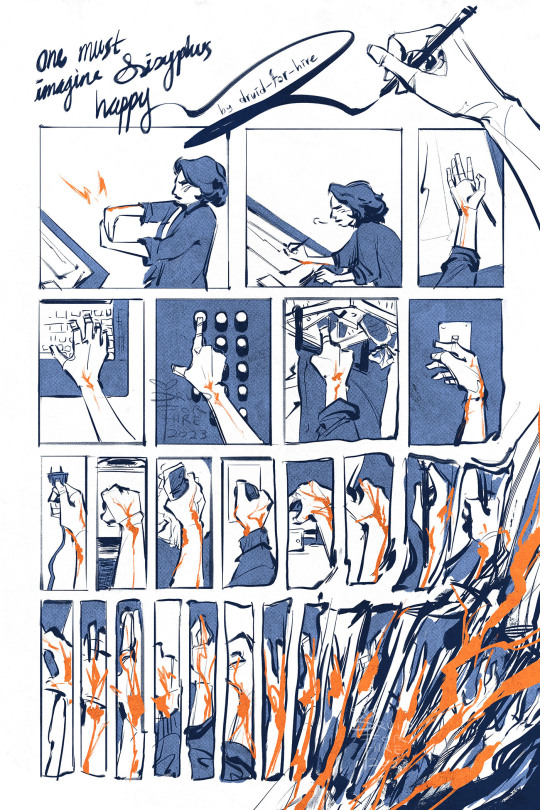
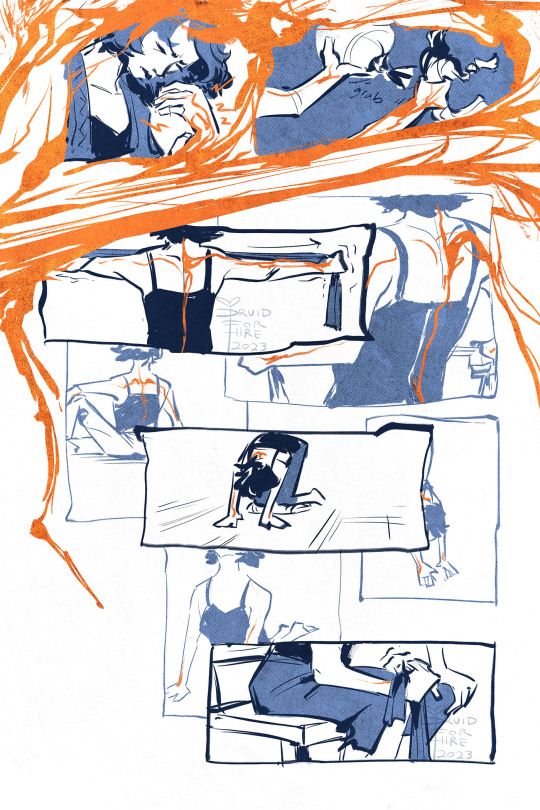
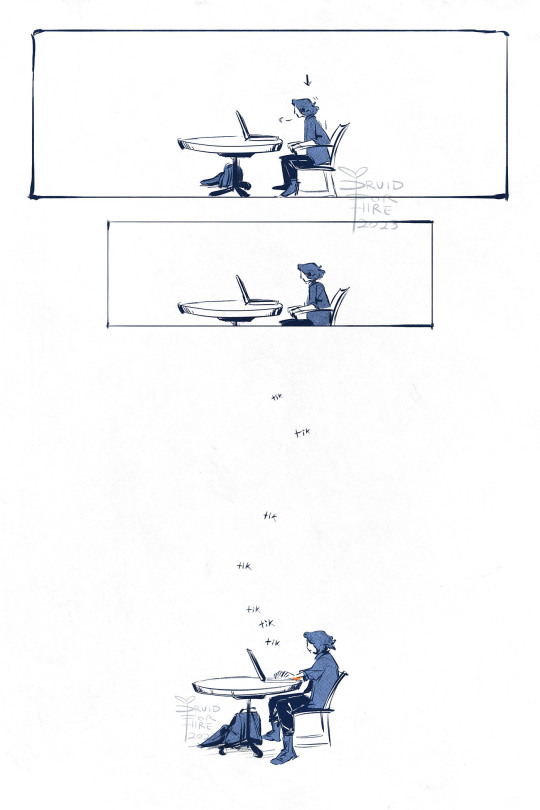
[images ID: three images of a comic titled "one must imagine sisyphus happy" by druid-for-hire. it is a visual narrative beginning with someone with wrist pain (depicted by bright orange nerves) working at a drafting table. the reader is shown the same wrist as the person uses it for many everyday tasks such as carrying a grocery basket, pushing elevator buttons, typing, and doing dishes, until the pain dissolves all the panels into chaos. the person then performs several physical therapy exercises until the pain subsides. they sit back down at a desk with their laptop, sigh, and begin typing. a small spark of pain reappears. end id]
a fun little piece i made during the semester and submitted into our school comic anthology! (which you can buy at the Static Fish table at MoCCAFest in NYC ;] ). it's about artists and injury
#comic art#comics#original comic#chronic pain#carpal tunnel#tendonitis#my art#original#edit: what a delightful surprise to see this take off#this was made for class on very low fuel and very few thoughts and late at night and exhausted#the prompt was just a wordless narrative essay. three pages. and i had nothing and no ideas#and my head hurt and i was too tired to think about doing any of the like. research and mind mapping and ideating i'd do otherwise#but my arm hurt#so i decided to do a thing about arm hurty#i'm surprised to see so many people finding it resonating with them#but then again i shouldn't be. the universal lies in the specific#i should make more things about smaller stuff
12K notes
·
View notes
Text
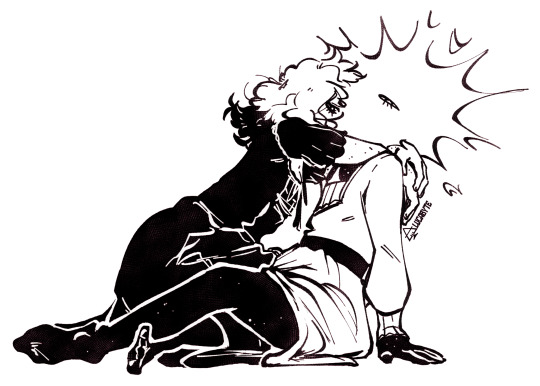
leering
#its MYYYY flat fuck friday and IIIII get to post the trans women#in stars and time#in stars and time fanart#isat#isat fanart#isat siffrin#isat loop#sifloop#lucabyteart#anyway this was fabric practice because as a silly funny animal artist i dont draw clothes often especially not dresses#so here i will indulge the transfem sifloop truthers because hello comrades i mean what i said in my essay after all#so know that this was the intent with which this img was drawn its not just nonbiney its something specific for you lot#<- (to find said essay. look in the lucabytewrites tag. thanks! its a few months back. it opens with a joke about shredded cheese)#(youll know it when you see it. hopefully.)#edit: lmao i drew and queued this before that anon asked adrienne if theres any transfem characters. and like. head housemaiden win#but also anon. pspspspspss. come here. come closer. join me. Join Me.#we can be Right. Together. 🫴
759 notes
·
View notes
Text

Turbo Granny blunt rotation WIP
#for a class assignment due todayyyy#still gotta edit the fucking 600 word description yuck#and write another essay for a different class#and read another manga chapter for that class#and do makeup readings/hw for my mesoamerican art history class plus the readings/hw for this week#and i haven't been sleeping more than like 4 hrs a night cause i started a new medication#which also gives me evening heart palpitations lol#and im skipping class to finish as much as i can#but eventually ill clean this up and color it!#eventually#hopefully#next term i snagged a spot in the only 2D animation class this stupid college has ever had#and set up my schedule to only take up 3 days despite having 4 classes#and hopefully 2 of said classes will be pretty easy#ones a 1x a week gardening thing and the others an online design class#i wanted to leave lots of time to animate#dandadan#turbo granny#animation#fanart#dandadan fanart#character turnaround#art#digital art#artists on tumblr#trans artist#my art#my animations#krita#tw drugs
856 notes
·
View notes
Text
fuck it. thinking about a girl riding my strap when she figures out how desperate I am to cum just from fucking her.
her hips rock again and she stretches, slick and glistening, around the head of the strap. I whine as I watch her sink down fully, but I can’t move to touch her how I’d like. my hands are neatly tied to the headboard, courtesy of the girl on my lap right now. she laughs at the painfully turned on expression on my face.
“awww. what’s up, darling?” she coos, sighing as she works herself slowly up and down the length of silicone. “am I teasin’ you? is someone getting a little flustered down there?”
any answer I might’ve been able to give fizzles out when she props a hand on my chest to pick up her pace. I drop my head back against the duvet and groan as the orgasm I’d been rapidly nearing comes steaming back. we’ve been at this for at least an hour, and she’s already cum at least three times. all without letting me cum once. I’m struck wordless, desperate, by the sheer weight of my desire for her. so when she begins to lift again I shake my head and whine.
“no, please. please please please.”
she grins and shunts her hips back down fully, completely swallowing up the ruined strap. it’s the visual of her cum from two orgasms ago smearing into my boxers that makes me arch and jolt.
“fuck—oh fuck, I can’t—m’gonna—fuck—”
for one blessed moment, I think she’s going to finally let me cum. then she laughs again and I feel her teeth nip against my neck. “so fuckin’ eager to please, aren’t you? are you actually gonna cum just from this?”
something snaps above me. I don’t need to look up to know I broke the headboard; I felt the tension holding my hands loosen. but before I can move to touch her, a nimble hand pins my wrists above my head.
“ah-ah. no, darling. you look so good and pretty right now. I’m not done usin’ you yet. you just stay still and let me—oh, awww. are you crying? need to cum that badly, do you? fuck, babe. you’re so, so desperate to be good for me, aren’t you?”
I nod instantly; squirming against the euphoric precipice she had me balanced on.
“please,” I sob. “please, fuck, please.”
“well go on then.” she rolls her hips and the sound makes me moan. “be my good desperate slut. cum for me.”
there’s something missing, and she knows it too. she’s just waiting to drag the answer free and I’m too whiny to hold out. her smirk turns wicked and she gives my hands a little shove into the bed.
“but that’s right. you can’t, can you? you need to watch me fuck myself on you again, babe?”
even as she says it, her hips slide back into motion. up, down, languid, just how I like. I’m a horse in the gates, a pulse in the veins, raring to go. all I need is one last push. she pauses when she sinks to the bottom to roll her swollen clit under her fingertips and her head tilts back as her eyebrows furrow.
“mhmm. fuck, you fill me up so fucking much. I could sit right here for hours. c’mon, babe. I know I nearly have you. close those pretty eyes and give me what I want.” she starts into motion again, and this time it’s rough. chasing release. her hips slamming down into mine with slick, wet sounds. she lowers her mouth to my straining neck. “fucking give it to me. cum for me. cum for me.”
her words push me to breaking point, but it’s her low moan in my ear and the resulting wetness dripping into my boxers that sets me off like it always does. I finally hit that sunlit peak and I arch into the golden heat of it as everything in my body freezes in adoration of her. offering up my orgasm to the goddess above me. she can take it, I have no need for it. it’s all for her, every ounce of me. I come down from it slowly, twitching as I pant and whine underneath her. a hand slips over my cheek and her careful thumb strokes my cheekbone.
“there. hey, shhh. there we go. so good. oh, you just couldn’t hold on, could you? my poor girl. yeah, I got you. I’ve got you.”
I squirm again, trying to steal another orgasm while I’m still hazy from the first, but she tightens her grip and holds me steady.
“ah. where’re you goin’? that’s just one. I told you, I’m not done with you yet. I wanna see exactly how much I can make you cum without even touching you.”
#and so on and so forth#ahem#I present this uh essay on umm loving women#lesbian textpost#wlw textpost#nblw textpost#sapphic textpost#lesbian#wlw#lesbian nsft#wlw nsft#nsft lesbian#nsft wlw#masc lesbian#lesbian switch#lesbian sub top#lesbian smut#lesbian service top#<-maybe?? who knows#not to get Vulnerable On Main but holy shit I need a girl to give myself to like this#ANYWAY—#starryeyes#sorry if it’s messy I’m yearning too bad to edit#writing more like wlwriting am I right?
587 notes
·
View notes
Text
endlessly thinking thoughts about cr characters, morality, and selfishness (likely place for me to be, given that my day job includes endlessly researching ethics and meaning of life) but in light of bell’s hells most recent illustration of their insularity and individualism, I’ve been really like. Trying to unpack why I find it particularly egregious in this party when obviously mighty nein were notoriously self-interested, especially at the beginning, and when vox machina had quite a few moments where their horses were far higher than they had any reason to be. And again, I really want to make it clear her that I don’t hold self-interest or selfishness to be some abhorrent and unforgivable thing, in fact I think its incredibly normal especially given the context of main characters in a story told through game mechanics that flourish on the interest of the individuals making the choices. I’ve written before about how one of the throughlines that I’ve seen in laura’s pcs (since I’m someone who particularly enjoys looking at the moral outlooks characters develop) is a common thread of morality that’s highly dependent on their own interests. And like, this is a positive throughline to me! Without getting into my own views on morality, it is particularly compelling to me for characters with isolated upbringing (which applies to vex, jester, and imogen, each in different ways) to develop a moral code informed by that isolation, and in vex we see her moral code is ‘anything goes if it protects those I hold dear’, in jester we see a moral code that doesn’t care about morality as much as it cares about the chance to care and be cared for, and in imogen we see a moral code developed in response to her very unique experience of hearing the darkest parts of people and judging them on those (which to be clear, i am not judging her for that fact, I think it makes extreme sense for someone who hears the thoughts the people have to be horrified by those things, but it does mean her moral system is almost completely backwards, where intention holds more weight than action, which perhaps makes sense of the popularity of defending all of her ideas and choices and the Right Ones by certain parts of the fandom that insist leftism is hidden in the dnd real play). And that’s all to say that, out of the cr parties we’ve seen, I don’t think any single member of bell’s hells is uniquely more or less selfish or more or less of an asshole than previous characters. And in fact, I tend to be quite fond of selfish characters, I have a well documented history of cherishing them well beyond the cr fandom. But the point is that my calling something or someone self-interested is not a value judgement in this context, it's a descriptive claim about the traits a character exhibited.
Imogen, who has insisted time and time again re: the values of the accord that she would not be swayed by the temptation of predathos because she recognizes the importance of this fight, only to turn around and pretty immediately open herself up to predathos to fulfil the most threatening part of ludinus’ plan is self-interested. I cannot conceive of any other way to describe her choices. And her being self-interested doesn’t mean she can’t also be altruistic at times, but I will be clear that I don’t think her risking killing herself as she attempts to bring down the god-eater that she released is particularly selfless. In my best faith interpretation I’d say she’s pretty middle of the road in that choice. But I bring all this up because a comparison I’ve been seeing is that bell’s hells aren’t as mean as the mighty nein or even vox machina in certain moments and that it doesn’t make sense for the fandom to view bell’s hells as likely to be villains when the same wasn’t true of the previous two campaigns, and I think I have to pretty emphatically disagree, and not because I don’t think there aren’t moments in both campaigns that feature extremely high levels of assholery and villainry from pcs – I mean, some of my favourite cr characters are percy and jester, both of whom i’d say are ‘good guys’ due to the pure luck of the found familys they fell in with and both of whom often suggested plans that were. Not okay. To say the least. But ignoring the difference between suggesting fucked up plans and walking your god-eater infused bestie back towards the troops sent to support you in keeping that entity contained, the other big difference I’ve noticed in my own introspection on how I react to bh vs mn and vm, as well as which things i cherish about previous campaigns that were really missing from c3 to what I think is the story and the character’s detriment (staying away from the shape of the narrative, just because others have made posts that put words together better about that than I can) is that while members of vm and mn remained self-interest to the end of their campaigns and have reasserted those habits in appearances since, the parties as entities working in exandria had both, to echo ashton’s apt suggestion to ludinus, grown up.
Like one moment I think of is beau and fjord’s convo in the nein hells episode, because beau is being her asshole self and fjord is being his ‘I care about My People and I’ll think about the rest later’ self (i say affectionately but certain parts of the fandom I recognize would view derogatorily) – clearly they’re not the kindest people as they discuss bell’s hells, but two notable things are (a) they still treat the hells with the respect and use their means to help them prepare for the battle coming, even when they hear the horrifying thought that the hells aren’t certain they’ll choose to save the gods, all the nein request is that they choose the kind option (b) they say none of their doubts to the hells themselves – likely because they have the empathy to realizes that its a high stress situation that won’t be made better by a reminding the hells how small and likely ineffectual in the universe they are – and their comments about cannon fodder are ones made in jest to each other. Even taking that in the worst faith interpretation, the jokes that beau and fjord make in a private conversation has absolutely zero influence on bh. This is quite different than bells hells, after like. as clearly betraying the accord they promised to assist (even if their intentions are ‘good’) as is possible, belittling the religious armies sent to support their endeavor to keep predathos sealed as they all feel the weight of an irrevocable change occurring in exandria, one bells hells has first account knowledge now that it IS incredibly willing to eat mortals, and laudna and ashton, the members of bells hells most often cited by certain fandom spaces as characters who have gone through so much and it only made them kind and strong, look into the faces of people facing literally existential threat and laugh and mock them. That is, mighty nein as individuals is comprised of some of the, perhaps, most asshole pcs, but The Mighty Nein as a party is committed to treating others the best they can, to leaving things better than they found them (a quote that I think is particularly exemplary of the dynamics of self-interest at play in the mighty nein, since it originated as a blatant illustration of molly’s notion of self-importance but developed to become a kind of commandment that the nein became committed to fulfilling). The opposite is true of bell’s hells, where orym and dorian at least both seem to have motivation beyond themselves, imogen’s changes but has shown she is capable of letting go of her ‘intention reigns’ requisitely individualistic perspective, and chetney plays up his selfishness but has shown himself to care quite a bit for people beyond their party but bell’s hells as an entity is uh, pretty self-interested.
To clarify some of my thoughts here in the spirit of the wicked renaissance happening rn, I’ve always felt that for good was an incredibly apt song for the mighty nein, because it really nails that feeling that perhaps they didn’t change each other as individuals to become better people on the grand scale, maybe they’ve just changed each other permanently, but they (and I would agree with this) view each other as having changed each other for the better (e.g., I don’t know if I could say whether jester is a morally better Individual at the end of the campaign, but I can say with certainty that she fulfils and makes moral choices in her work as a member of the mighty nein). And I don’t know if this can be said about bell’s hells – I think they have certainly influenced each other and changed how alone many of those characters felt, and that is not a slight on the story, it can be a great centre for a story to focus on how a relinquishment of the feeling that one is alone in the world can change them. But for the most part, that hasn’t been bh’s story, their story instead has been about validating their refusal to become anything beyond what they insist was out of their control. And not to get to annoying philosophy student about it but bell’s hells are maybe some of the most explicit examples of sartrian bad faith I’ve seen in fiction in a hot minute, because their insistence that they treat their wounds as incurable and entirely out of their hands has led to them limiting their own potential because many of them ignore their responsibility as people to make choices in their own lives. In contrast, at the end of the campaign, mighty nein are still assholes as we all like to refer to them as, but in the context of an apocalypse, I think I’d prefer the assholes like fjord – who is certainly being truthful when he says he doesn’t care about what harm comes to 200 people when jester is at risk but who also, as they traverse into aeor, is insistent that their group won’t be running away from whatever apocalyptic threat awaits them, even if that means dying in the fight – than I would an asshole like ashton – who promises to fight for the little guys but who then turns around and acts upon a philosophy that says the strongest will survive. When you look at the mighty nein, it is incredibly easy to see the fingerprints of change they’ve left upon one another, and even to see the boundaries they place on one another’s asocial behaviours through their presence in one another’s lives (more recently the group chastising jester’s fond words about ludinus is a good example, but others are yasha’s pressuring caleb and essek to move on from their wizard talks as they collect paper in aeor instead of venturing further toward the battle they have to fight, or fjord and jester’s frustrated conversation in the ukotoa reunion about how fjord made a stupid decision and he doesn’t regret but he feels dejected and jester checking him on the fact that they still need to figure out a solution). It takes some extrapolation to see how bells hells have changed each other in more than aesthetic ways, if they have at all. Because the catalyst for change is pressure to do so, and aside from moments where it was truly change or be left behind, bh doesn’t challenge each other unless forced to by morri’s trials or delilah’s interruption and on the very odd occasion an interesting game of rollies-spin-the-bottle.
And it’s interesting because the asshole behaviour of the mighty nein, like bell’s hells, stems from being left on the outskirts of society and the mistreatment that comes with that, so seemingly the change from being alone to being with others is one that actually insists upon being challenged to grow and change. I mean, just looking at the starting points of the characters, there’s an intriguing amount of stark similarities between their pasts; jester and fearne were both people loved dearly by the family they grew up with but who were loved within the confines of a gilded cage, ashton and beau both have an glaring self awareness that their anger at the world has a very particular source (their parents) but use that as justification rather than a means of self reflection, yasha and orym are trying to navigate a world in the wake of an incomprehensible loss and a sense of duty, fjord and imogen are both seeking out knowledge of their own powers and unknowingly retreading the paths of their missing and presumed dead parental figures. The idea that bell’s hells are uniquely mistreated by society in the history of cr player characters is, politely, laughable. Absolutely they’re mistreated, and I think it could be fair to say these characters are more defined by their isolation than others but I think that has more to do with the lack of downtime rp than it has to do with the context of their suffering.
What I have loved about the mighty nein is that in their realization that the bonds they forge with each other are undermining the truths most of them had taken to be true – that they were alone and without a place in the world – they are also forced to realize that no longer being alone and isolated comes with the weight of social responsibility. And this was born out of a willingness the mighty nein had to call each other out and that the players had to allow their characters to be wrong and get called on it. Because that’s the friction of living with other people on the small party scale and the large world scale – in the mighty nein’s ability to survive as a people who cared for each other even when they didn’t agree or when they made decisions that they couldn’t understand, they were constantly developing their ability to care for the very same world that left them alone. Because in campaign two, the world as a whole had the role that the gods have in campaign 3 – why should a party of nobodies, treated like shit by the world and the people in it go through the effort of saving it?
And the mighty nein answered, in their own imperfection and assholery, that nothing is ever just one thing – one of the things I cherish most about campaign 2 is its commitment to ambiguity, allowing the complexity of the world to go unsolved because there is no solution to the fact that life is immense and sometimes incoherent. I don’t think its a coincidence that I’ve seen some of the people lamenting the idiocy of fandom members like me who think that it actually isnt a leftist win to destroy the world in the hopes of spontaneous justice arising in c3 are the same people who criticised c2’s conclusion with the cerberus assembly for not being leftist (a word which for them means . the aesthetic image of a rebellion sparked and not the unending commitment to doing what you practically can to make life more just for those around you – whether they’re particularly kind to you or not) enough. The conclusion of c2 emphasizes that the choice to make the world a better place isn’t something that can be achieved in one single sweeping action that will wipe the boards clean – there is no murder of all the members of the cerberus assembly that would’ve solved the problems that caused the assembly’s power. There is no forcing of the god’s out of exandria that will deal with the actual issue undergirding both bh and their blorbo-moralized fans' criticism of the gods, which is that mortals are cursed with the burden of free will, and being mistreated by other mortals means constantly having to try and make sense of the fact that someone chose to do something cruel to you (and, sometimes, that you made a choice that allowed that cruelty to occur) – a burden made much heavier when the person who hurt you is your cult-indoctrinated mother, or your cult leader father, or the person in the mirror. The mighty nein take up this fight, and the complexities of their individual identities begin to heal in the light of a commitment in their relationship as friends and as a team to improve the world, even on the small scale. Bell’s hells remain gridlocked and stagnant and unwilling to change in an unspoken turf war of self-interest because they’ve insisted (influenced in part by the context of the campaign 3 narrative but, as others have aptly pointed out, that narrative was much more influenced by bh’s lack of curiosity regarding anything except their own minds) upon finding a solution to a problem they’ve decided is earth-shatteringly (quite literally, to the people of ruidus) unjust based on, aside from encounters where fellow mortals were the primary oppressors, their own testimony of the god’s not listening to them and the obvious villain’s parallel testimony. Something I’ve really been chewing on lately is caduceus words to fjord about his role as a paladin of the wildmother – that maybe it just means that someday, someone will pray for a miracle, and there fjord’ll be and the weight that has given that fjord’s bond to ukotoa came from his desperation not to die and his willingness to accept whatever help would be offered, that fjord could now be the person that reaches out to someone in need, and that the hand he offers won’t come with a curse. And I think that’s really the poignant difference between bh and mn for me, that for bh, their experiences of injustice, though did make them personally bitter, did not make them morally misanthropic.
Comparatively, Bell’s Hells chose to ensure that, because the gods never answered their prayers, they shouldn’t be permitted to answer anyone else’s. Is this an understandable position? Sure, for the walls of a preschool, not really for a group of characters that I will ever be in any way inclined to view as something close to heroes. While it’s true that there are parts of life that are beyond our control – somethings happen to us that we have no say in, and they cause injuries both physical and mental that we are left to heal without any rhyme or reason, it is still our responsibility to heal them. And if you choose not to, well, then you’ve chosen not to, and are responsible for the consequences and judgements that choice might amount to.
Anyway, sorry this is all over the place but TLDR: calling bell’s hells as a party self-interested is actually just descriptively correct – they can save members of the party made up of their close friends and still be self-interested – and while the individual members of bell’s hells actually aren’t all that uniquely self-interested in the history of cr pcs, the party is uniquely self-interested in how they’ve chosen to navigate the world an their responsibility to the people in it.
#cr spoilers#cr meta#this is some very bad writing on my part but this is like draft 10 of compiling my thoughts on this particular comparison#and i need to save my editing brain for thesis editing so. embracing the 'make bad art' but. write bad essays. this isn't an essay#its projectile word vomit but alas#critical role#critical role spoilers#bell's hells#the mighty nein#mighty nein#cr2#cr3#my post#long post#(truly i'm sorry for the length i have overwrite disease)
268 notes
·
View notes
Text









afrofuturism🪐
☆ one ~ solange hair by darknightt (tsr warning) ☆ two ~ loretta hair by @simtric ☆ three ~ bahati braids by @sheabuttyr ☆ four ~ isonoe hair by octetsica ☆ five ~ binah braids by @sheabuttyr ☆ six ~ cornrows & curls hair by @leeleesims1 ☆ seven ~ indie hair by @sashima ☆ eight ~ loc petals by @shespeakssimlish ☆ nine ~ mnemosyne hair by octetsica ☆
mini dedication essay to black simmers and ts4 creators below! pls read if you have the chance! <3
this edit is a small homage to afrofuturism and the various unique black hairstyles (and especially the black creators of most of these hairs) that i have downloaded and admired over the years! some of these are old and some of these are new.
to me, afrofuturism means constantly honoring/reclaiming/challenging the past while constantly creating/dreaming of a better society/world/future. a society/world/future that embraces and empowers all of our differences, ingenuity, aspirations, and unique lived/cultural experiences. a society/world/future that does not limit us through the various systems of marginalization and oppression (racism, homophobia, transphobia, fatphobia, sexism, xenophobia, ableism, classism, colorism, etc.) that often affects how we, as black people, live today.
blackness is so diverse and intricate yet it's always been a struggle to find my culture within a game that's known for being so limiting, bland, and extremely eurocentric when it comes to hairstyles, clothing, food traditions/events, etc. black simmers have always had to figure out how to make this game more inclusive and make it resemble either more like how our ancestors lived, how our current lives are, or how we would want our lives (and even our children's lives) to look like in the future no matter how dystopian the real world look and feel now. fortunately, these hairs and their uniqueness bring a huge sense of culture and style to this game. they have always inspired me and made me feel extremely proud to a part of the lovely african diaspora (and the ever-growing black simmer community).
in a way, being a black simmer and cc creator usually means that we are often digitally creating our own worlds as afrofuturists to varying degrees (whether we know it or not) every time we open our game, make our sims, make houses, and/or make black cultural cc. also, now i know that cc making is not easy to do and is extremely time-consuming so this post is also just me giving all black cc creators especially those who create for free their well-deserved flowers! here are some other black cc creators who created cc that have greatly impacted my game since i first started playing sims 4: @/leeleesims1 @/simtric @/hi-land @/yuyulie @/sims4bradshaw @/ebonixsims @/xmiramira @/sheabuttyr @/qwertysims @/oplerims @/sleepingsims @/shespeakssimlish and so many more im forgetting probably (im too shy rn to tag ppl but i greatly appreciate y’all fr i hope y’all telepathically get this message somehow 😭).
last but not least, i am hoping that this inspires somebody to keep creating or start creating regardless of what they think their skill level is! somebody will absolutely fall in love with your work and/or your art/work will 100% change someone's game forever <333
#ts4#sims 4#the sims 4#black simblr#black simmer#ts4 edit#🪐#🪐 black hair#soleil jones#xolani souza de oliveira#angela evans#leona morrison#chantelle diang#ayesha solomon#nylah rivers#nykhor chantelle diang#dove adeyemi#something to end black history month with!#i really hope my essay make sense 😭😭😭#i planned to this last year but hated the pictures i took so i scraped it and redid it#i couldn’t thank enough to all the black cc creators before me and hope to help/inspire new black cc creators 🙏🏾#this is also kinda the updated version of my for the culture post…i made sure to include some familiar (but updated) faces 😭☝🏾💗🙈
1K notes
·
View notes
Text
My dealer: got some straight gas 🔥😛 this strain is called “alectopause” 😳 you’ll be zonked out of your gourd 💯
Me: yeah whatever. I don’t feel shit.
5 minutes later: dude I swear there’s symbolic meaning behind the cover art skeletons
1K notes
·
View notes
Text
Bruce would send a huge paragraph text to Jason, and Jason would just immediately send it back edited.
#no he didnt answer the questions asked#he just sends back a whole essay of edits#text post#batman#batfam#jason todd#bruce wayne
397 notes
·
View notes
Text



But whose heart would not take flight? Betray the moon as acolyte On first and fierce affirming sight Of sunlight, sunlight, sunlight
#bg3#bg3 edit#bg3 screenshots#astarion#i have so many fucking FEELINGS about this scene#like the bathing in sunlight would be powerful enough#but it's freedom it's cleansing it's healing it's peace#in the context of what happened the previous night#he doesn't want to turn and look at the PC#his FACE when he has to#UGH#I could write essays#novels#epics
2K notes
·
View notes
Text












Jane Doe's backup dancing skills <3
#have i perchance mentioned she's my fave#she's just. so autism. i love her.#me after watching stop making sense �� me after watching rtc: i need to move weird more#jane doe#jane doe rtc#rtc jane doe#ride the cyclone#rtc#emily rohm#rtcedit#ridethecycloneedit#ride the cyclone edit#what do people tag these things as jflksdjf#gonna do this for the others too. AT LEAST for ricky cos him at the start of tsia kills me every time#anyway i need to go work on my essay now. hate being at uni they keep making u do work when i just want to autism about this musical :(#rtc edit#lily edits#lily dot tee ex tee
1K notes
·
View notes
Text
we're at that time of year again where people start whining about how the Polar Express is "creepy" and "unsettling" as if that's not exactly what makes it the perfect Christmas movie.
#in this essay I will-#polar express#mine#christmas#some of us have always innately understood that the horror is a huge part of the magic and emotional core#edit: I HAD THE WRONG WHERE HOW DO YOU EVEN MESS THAT UP
153 notes
·
View notes
Text
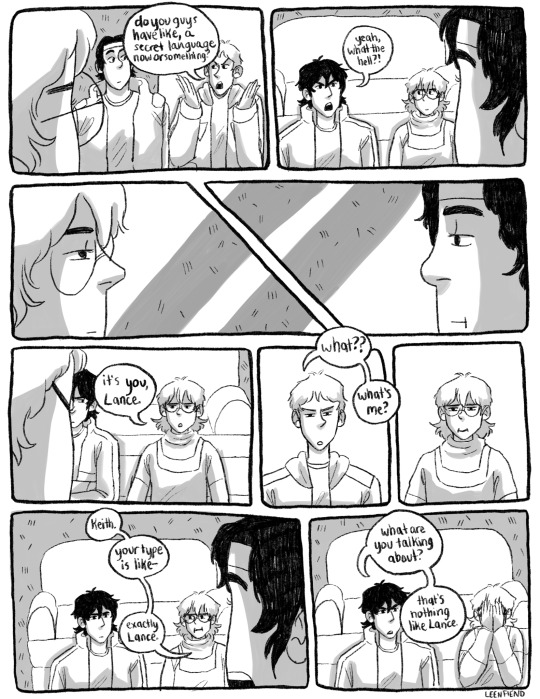
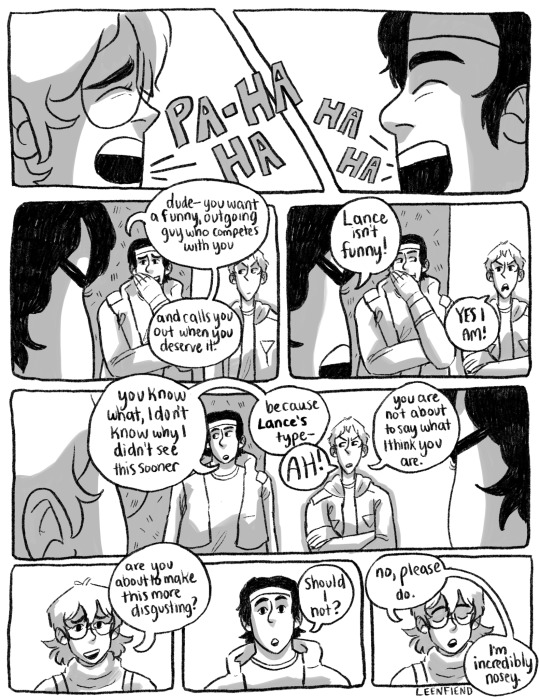
what's ur type first < prev next >
#YAHOOO#i finally finished editing this first scene in the fic lmfao ... so updates will probably be faster in the coming days#also still unsure as to whether I'll draw... the whole fic#it's like 10k words+ so#im still on like page 4 rn I think. out of like. 20.#let me know what u think tho do u guys want this all drawn out cause .. .. it'll take a lil while also i'll definitely still post the fic#ive put too many hours into that bad boy at this point to let it collect dust#and i think u get something different out of reading that than the comic anyway tbh#which is fun !!#ok enough tag essaying thank u all for reading if u did : )#wut#what's ur type#klance#vld#voltron#my art
1K notes
·
View notes
Note
i'm so curious about your character gender reads now tho 👀👀
(You enter the kitchen and see me, eating shredded cheese out of the fridge by the handful)

(I turn around to face you.)
Hi. Do you want me to sell you on amab NB Siffrin? I'm going to try and sell you on amab NB Siffrin. And maybe even a little bit of tranfem siffrin and/or loop. as a treat. just for you.
So, (I put the cheese back in the fridge.)
This read of mine comes from a number of things, a lot of them to do with the game's themes, and to do with Siffrin being a narrative foil to the other characters. And Vaugarde as a whole.
(READMORE WARNING: THIS IS LIKE 6K WORDS LONG. YOU ALL SHOULD KNOW BY NOW I DON'T MAKE POSTS WITHOUT UNCONSCIOUNABLE AMOUNTS OF EVIDENCE AND EXPLANATION. IF ANYTHING I'M BEING RESTRAINED HERE. THUMBS UP.)
(Pre-readmore note: this is in response to me having given an analysis of how I personally percieve Sifloop in relation to asexuality and shipping. Which you can look at here. (x))
It is however, not what my like, no-holds-barred no-rules just-for-me headcanon for Siffrin would be. (which is intersex 'head empty no thoughts' siffrin, for the record). This is instead my close-reading-of-the-text-and-themes interpretation of Siffrin. This is why I'm gonna be saying Read and not Headcanon, to distinguish the two. (Anything I consider a little bit too much of a stretch vis a vis interpretive hard reads I will call a headcanon. But those are for the last bit of this post.)
Unlike *gestures at mass media* All That… ISAT is already packed to the gills with queer rep, to the point where I feel no need to grasp at straws and make overextended reaches into obviously unintended subtext. Like with, y'know, most media. Since here, the subtext isn't unintended. Like this isn't a Transfem Metal Sonic or Aroace Ash Ketchum situation where I know none of the evidence is on purpose and I'm just having fun making a conspiracy theory pinboard out of it. This is like… There's intentionality there. And I want to engage with it on its level, see what the text itself suggests. It's my personal preferred method of expressing deep respect to a text. (Not that it has to be anyone else's, obviously. This is just my way of showing I love a work.)
So yeah, I am, in general, very interested in hearing hard-fought arguments when it comes to interpreting texts. I'm glad ISAT has a lot to pick at here, and so, I will. (and since not a lot of texts ever have anywhere near this kind of depth in this arena, i don't wanna squander it… i'll try and keep my own biases as in check as i can, and already have done by hashing quite a bit of this interpretation out with two people of very different gender identities to mine. To put it mildly, binary-aligned or transfem I am very squarely Not.)
(Now that the cheese bag has been removed from the equation, I drop this framing device, sit you down at the table and begin to dredge up evidence from below it.)
Okay, so. What are my like… Core reasonings here? I think I can split it into three categories. Broadly, with an amount of overlap, so bear with me…
SIFFRIN AS A FOIL AND CONTRAST TO MIRABELLE, ISABEAU AND THE CHANGE RELIGION AS A WHOLE.
SIFFRIN'S HABITS OF CLINGING TO 'KNOWN QUANTITIES', SCAPEGOATS, AND THEMES OF RACIAL IDENTITY INTERSECTING WITH GENDER IDENTITY.
SIFFRIN, LOOP, DE-PERSONING, DEHUMANISING, APATHY AND SURVIVAL.
Okay so up top I'm going to split my argument for Siffrin's gender identity Present and Future here. This means, for now, I'm arguing for AMAB NB Siffrin alone. The transfem stuff is for later (and more for loop, in my mind, too).
I have a few direct observations of the text here that set things up. Here are the things in-game that make me assume that Siffrin, as of the start of the game, has not yet undergone any radical change to their identity in their life. Not on purpose, at least. These are ordered in a messy but logical flow, so uh, try and keep up. I'll synthesise at the end. I Prommy.
SIFFRIN AS A FOIL AND CONTRAST TO MIRABELLE, ISABEAU AND THE CHANGE RELIGION AS A WHOLE.
CHANGE & THE UNIVERSE: PERCEIVED OPPOSITES
When interacting with most objects in the Changing Room in the house, they express a genuine curiosity toward body craft. It seems they are legitimately unfamiliar with it on a deeper level than having simply heard of it.
Despite this curiosity (explicitly stating they've previously wondered about it), they dismiss it as too much work early on in the game. These points combined seem to suggest to me that they have never previously sought out any kind of real change to their appearance or identity. Either for gender reasons, or other body dysmorphia reasons. (Which, despite the dismissal, they do refer to their body as a 'meat prison', which is not particularly positive) However...
This changes in Act 3. In acts 3 and 4 they flatly state: "You're thinking about crafting your body. You seem to have all the time in the world now." While still never spoken aloud, their declining mental state corrosponds with a worn-down, almost nihilistic reckoning with the feelings they masked with the 'meat prison' joke in act 2.

[Image: Interactions with the change craft textbook in acts 2 and 3/4.]
In talking to Mirabelle, they are very self assured that one can stay the same/be comfortable with their born identity. They also seem a little unsettled by the change religion's flippancy in general, which makes sense, as they have been clinging to the famliar (even when painful) to cope with other traumas. (More on this later, section 2)
The Universe Faith appears to heavily disincentivise Wanting for oneself and other expressions of Free Will due to safeguarding against Wish craft. This seems to have impacted Siffrin's mental state majorly, even if they do not recognise it. The followers of the faith are (if Siffrin is to be believed) incentivised to 'go with the flow' and take paths of least resistance, and those that DO make big decisions will tend to justify things as being The Universe's Will. (See: The King's entire Modus Operandi, and the way Loop (and Siffrin) do the same rote actions, constructing worldviews (the play analogy, the Universe's Will) and justify that as what the Universe Would Want (despite a total lack of evidence to prove as such)) As such, it seems as if a follower of this faith as neurotic as Siffrin would be unlikely to act upon any Wants to Change Themselves without a lot of turmoil and backwards-justification. (Of note, Loop's forcible change coinciding with a dropping of pronoun. But that is again for later, section 3) As of the start of the game, they do not appear to have broached this kind of turmoil directly.

[Image: Act 5 interaction with the star journal, emphasis on it being a cautionary tale against reckless usage of wish craft, instilled so deeply to be a children's bedtime story]
Siffrin, in act 5, grows frustrated with both The Universe and The Change God, feeling abandoned by the former. They struggle with simultaneously anthropomorphising the Universe as a cruel onlooker, while also seemingly acknowledging them as a cold, almost scientific fact of nature. This would heavily imply that the 'blame' put upon the Universe by Siffrin in these moments is known to them, at least a little, to be potentially meaningless. It seems that somewhere in Siffrin's belief system is something, be it the core or merely a creeping worry, that the Universe is not a thinking, feeling, thing. And thus that their invocations of "The Universe's Will" are merely rationalisations of random chance and consequence. This is in DIRECT contrast to the Change God, proven to be an emotive sapient entity, who merely refuses to offer a helping hand. (Similar sentiments are, too, spoken by the Change God itself.)


[Images: Interacting with the window in the observatory in act 5, text from the change god meeting]
So. These are the bulk of my observations when it comes to how Siffrin is positioned in contrast to the Change Belief. It would seem to be that Siffrin, inkeeping with their role as an outsider, is a complete fish out of water in Vaugarde's change-centric world. This makes sense! It makes them a compelling foil to the Vaugardians in our cast, and allows the Vaugardians to challenge Siffrin's worldviews merely by existing. It also, more importantly, makes Siffrin an interesting lens through which to inspect our two most Change-driven characters. Mirabelle and Isabeau.
MIRABELLE.
Mirabelle and Siffrin's differing faiths are put on display the most frequently. Interactions like the circle key and the party's disbelief of Siffrin's facts about the stars make this clear. These interactions other Siffrin from the group further, and are another avenue through which Siffrin can ignore their own needs, not communicating with the party and allowing them to dismiss things he deems important.
Obviously, the friendquest is primarily about Mirabelle's struggle with her aromanticism and asexuality. But there's an implicit undercurrent of gender there too. Mirabelle has never made a big change, not like Isabeau. She has never 'changed completely', by her words. And Siffrin distinctly finds this an odd thing to be worried by. Whatever culture he carries has no pressure to explore these avenues, it seems. Siffrin is able to help her by sharing their honest opinions, that he's never felt the need to change these things, and he's happy (allegedly). Why should she?

[Image: Mirabelle's friendquest text] Siffrin is not thinking particularly hard when he first does the friendquests, they are just being themselves. By positioning Siffrin as this unchanged yet confident object, they are in the perfect position to help Mirabelle by being in her almost exact position, both sexuality and transgender status (albeit, with the caveats of potential alloromanticism, and a they pronoun), that they become her ideal foil. (And in fact, the subtle differences between their positions in canon add to this, showing a display of Perceived Genuine Truth, rather than simple in-group camaraderie)
Whereas…
ISABEAU.
When Mal du pays speaks as Isabeau, it says the following;

"I don't want to know someone who won't even try to change, who luxuriates in things staying the exact same like you do."
I don't want to know someone - Shame of being known, that's Isabeau's insecurity. Reflected back at Siffrin, who has become the worst thing imaginable to each of their friends, in Siffrin's own mind. He absorbs their insecurities like a sponge and incorporates them into himself. Empathy turned ill.
Who luxuriates in things staying the exact same - Now THAT'S interesting. This is not Isabeau's insecurity, it's Siffrin's own. But also, it appears as if, Siffrin, whom to Mirabelle was unflappable in that not changing was alright, has internalised some of her worry. That it is MDP's Isabeau saying this, though, shows this is about Personal Change, perhaps even Specifically Gender and Self Image, rather than Mirabelle's spiritual side.
Isabeau and his distinct change in personality and gender, to become someone who he actually likes… Diametric to Siffrin, who has been stagnant for a long time, presumably as far as they can remember. It would seem to imply they have no recourse against this argument. Siffin becomes, in his mind, the opposite to Isabeau, a man he deeply admires the bravery of when told the story of his Change. These are Siffrin's words against themselves, that they consider themselves to have never even 'tried' whatever it is they think Change to be.
So. These are my main points vis a vis: Siffrin as a foil. This reading would posit that Siffrin's He/They status is, well, almost accidental? Which I would imagine befitting of them. They are, at the start of the game, still the mysterious rogue who never elaborates upon anything. They aren't going to be correcting a they/them from a teammate who is likely far more cautious about assumptions.
Notably, Mirabelle excludes Siffrin from the label "man" in the bathroom monologues… But as does Siffrin when in the prologue poem room. Though one needs remember, Siffrin only expresses these thoughts internally.

[Image: Bathroom conversation featuring Isabeau identified as the party's singular man]

[Image: Prologue!Siffrin expressing that they are not a man in very certain terms.]
While I do wonder what Mirabelle's knowledge (or lack thereof, potentially! Did Siffrin actually divulge this to her, once? Or is she making assumptions again?) is here, this is pretty clear evidence that Siffrin doesn't see themselves As A Man. (that, and Adrienne's word of god "fella" comments). I'm sure you can see where I'm going with this… but.
The thesis here is, that Siffrin may want to explore their gender further; doesn't feel connected to Masculinity, and yet, keeps that He pronoun around? Well, the Universe does not, in Siffrin's mind, really allow for personal wants and desires. If their friends start they/themming them, then cool. They like it, but never requested it, so it's the Universe's will. But, asking? Making decisions and requests and rocking the boat? That seems to scare Siffrin a lot. It seems to scare them so much it causes a lot of, if not all of, the conflict in the game. I feel like it's a fair deduction that this aversion to humour their own desires pervades a lot of their existence.
Plus, I think there's meat there. By only allowing Siffrin to reckon with any potential desires to change only after growing closer with the family, you get to explore things like "How does Mirabelle feel that even the person who said she didn't have to change is changing." and the slightly less potentially harrowing (OR MORE, IF YOU WANT IT TO BE? IDK. I'M NOT YOUR BOSS.) "Isa's continued changing allows Siffrin a space to explore it, maybe even just by proxy, or maybe by joining them."
But mostly, this section is about how Siffrin not having Changed Yet makes them delightfully strong narratively; allowing them to relate to Mirabelle, and get cold feet when comparing themselves to Isabeau. I love this as a narrative strengthener. It's very rare in media that we get to explore a nonbinary character's thoughts and insecurities on whether or not they're "doing enough" to be nonbinary. Even less so Aligned nonbinary people. And reading that alignment and insecurity through the lens of a nonbinary person not fully disconnected from their assigned gender at birth? It's a very compelling exploration of a very common and raw and yet underdiscussed feeling, much like the rest of ISAT. I think this is an extremely potent element should it be read this way, and is only strengthened when taking Siffrin's other themes into account.
Speaking of which.
2. SIFFRIN'S HABITS OF CLINGING TO 'KNOWN QUANTITIES', SCAPEGOATS, AND THEMES OF RACIAL IDENTITY INTERSECTING WITH GENDER IDENTITY.
HOLDING ON TO WHAT YOU KNOW. (OR KNOW THAT YOU DO NOT.)
I explained above many of my thoughts on the Universe Faith, and trying to keep these two sections separate was difficult, but needed to be done for the sake of clarity. But this section and the above are deeply intertwined.
Siffrin… Holds on to the things they know. They do not know much. But man do they fucking hold. And yet, paradoxically, they are also avoidant about it.
It is made clear in the text, to the point where I really don't feel the need to rehash it here, that Siffrin's disconnection from their homeland is incredibly painful, but that they consider that culture utterly and irreplaceably important to them. They cannot face it, it is too painful. They cannot let it go, it is too important.
Knowing what we know of the Island's irl inspirations (though, word of god, the exact location is not supposed to matter, one can infer it from the text (and I did! within reasonable proximity!)), Siffrin is of an indigenous peoples of some description, more than likely. And at the very least, Siffrin carries with them inherent biases and ignorances that show that Vaugarde's conceptions of things don't quite mesh with their own. Bowing to the Vaugardian way of things could very easily be seen as assimilation, in this way.*
And identity? Gender? Presentation? Role? All of that has a cultural element. There's no telling what specifics Siffrin has lost in that arena, and that's the problem. Neither do they. How paralysing, the feeling, to know that should you change yourself you risk unknowingly erasing another piece of home? I wouldn't blame them for locking it off. Keeping their old clothes, keeping what little they can remember of themselves… It doesn't seem to me a conducive or safe mental space to get experimental.
And the Universe makes for a perfect scapegoat. As referenced in the section above, a lot can be justified should you call it "The Universe's Will", because who's there to call you on it? Hardly anyone. Your divine right to Freeze A Place In Time; Your Deserved Punishment for Wanting to be Loved: All of it the Universe-- If you want it to be. And thusly, if the Universe wanted you to be a certain way, wouldn't you already be? Wouldn't it make you so? (Wouldn't it take away your body, that which makes you human? If that is what it thought of you?) So best to put it out of your mind. Wouldn't want to accidentally wish anything.
But as the game itself puts it, personified by The King, you cannot stay mired like this forever. As Loop themselves puts it, they can "get so fixated, sometimes." At some point they need to allow themselves to grow in whatever direction they need, because in the end, they need to live their life. They don't need to abandon their country, their culture, but they can't let it restrain them either.
(* MASSIVE CAVEAT: im white as fuck boyyy. i cant say shit. im like technically Of The Land im like 90% pictish or something ridiculous like that so my particular line has never moved anywhere but. this is notttt something i have input or insight on. this is all gleaned from reading and listening to indiginous perspectives from wherever they may be. i am simply trying to infer from what the game gives us without inserting my own feelings on the matter.)
3. SIFFRIN, LOOP, DE-PERSONING, DEHUMANISING, APATHY AND SURVIVAL.
Alright, here's some less heady and purely-thematic points to round things out. And where we'll also address the fucked up star being in the room; Loop.
My last couple of reading points are the most potentially-transfem to me. Or at least the ones that really hammer home, to me, a seeming lack of want to be masculine-aligned.
ANOTHER NOTE ON THE 'NOT A GUY' THING.
Obviously, there is the aforementioned "Not a man/not that you're a boy" thing. This is rather straightforward, but also still pretty ambiguous. You can be masc-aligned and still Not A Guy. But it does seem to be of note that being a guy very much does not seem to be a goal of Siffrin's. I would posit this in direct contrast to… Isabeau.
But not Isabeau's masculinity. I would instead hold it up against Isa's femininity.
ISAT, as a text, has its characters have genuinely different levels of security in their gender identity, and Isabeau, despite still having insecurities, seems super chill on the gender angle specifically! Their internal strife comes not from their 'not feeling like a man enough' or 'hating being a woman', but instead from their self perception as a friendless nerd! Something that seems to be only tangentially related to Isa's gender, really?
The big dumb bruiser thing is certainly aided by being a dude, but Isa still seems completely comfortable referring to themselves with feminine language, calling himself a "mother hen" (prologue) and having "the heart of a fair maiden" (cookie snack time). (However, they also take being excluded from Mira's girly book club as a surprised compliment, implying they weren't expected to be excluded, and find it affirming.) And even further so, Isa states they want to continue changing further and exploring their identity more, being rather blatant that they might lean back into femininity (and more importantly, let themselves be outwardly smart again), since they're starting to feel hurt by everyone assuming they ARE genuinely stupid.

[Image: Prologue Isa calling himself a mother hen]
And man, this is such a breath of fresh air vis a vis representation. I don't think I really need to explain that. A character who's gender identity is driven by chasing euphoria, even if it started out by trying to drive out misery. Isabeau's character is so damn good. But this essay isn't about him, so get back in the crate, boy.
... So here we have Isa, who is genuinely comfortable reclaiming things about their birth gender, and Mirabelle who loves her traditionally feminine traits to the point where she feels a little guilty that she isn't rejecting them to foster change. And then we have Siffrin… who seems to reject masculine language…? Hrm… (… And then we have The King. A Masculine Title. Someone who Siffrin increasingly sees themselves in and deeply, deeply dislikes this.)
APATHY AND SURVIVAL
It should be clear by now that I see Siffrin's core character as being driven by avoidance and survival. This seems to lead to a lot of apathy, brushing off emotions that are too intense or events and occurences that are too painful. (See: just absolutely everything with Bonnie)
It's all Siffrin really seems to be able to do to Survive. They've travelled, seemingly alone, for what would be around a decade by what the game says about the island's disappearance. They've lived alone on the road as a traveller in a country that so openly welcomes strangers that THE KING and his whole motives can happen. Siffrin is avoidant and refuses to acknowledge problems or strive for help and comfort.
So. That line about the dress. Let's unpack the line(s) about the dress.
THE DRESS LINE, AND THE WAY IT CHANGES BETWEEN PROLOGUE, ACT 2, AND ACT 3.

Good god where to start with this. Full disclosure, the first draft here was way more vague in how I approached this line because I remembered it (and another line, I'll get to it.) way more tame, but going and getting the screenshots..... Siffrin. Buddy. We gotta unpack this.
In act 2, we have "You haven't worn a dress in forever!". This is a neutral, if seemingly a little joyous statement. All we really glean from this is the information that Siffrin at some point, wore 'a' dress. No real inferences there. (Maybe you could say that the singular as opposed to plural makes it more likely that they borrowed/only owned One Dress rather than owned several? But that's a massive stretch...)
Then, act 3/4 shuffles this off into a more general "You wonder if you'll ever wear different clothes again." Which is a more despairing and distant statement. Considering Siffrin seems to travel with only the items they can carry, and owns sleep clothes... It's unclear how many changes of clothing they have. The party seems to consider the cloak a pretty permanent fixture, anyhow. But this line doesn't really say much aside from 'oh god i'm losing myself to the time loop malaise'
NOW THE PROLOGUE. Prologue Sif, buddy, pal, Loop, if I'm allowed to call you that....
Thousands of loops in. We are wistful for specifically dresses. You've forgotten almost everything. You dream about someday seeing the sun again. To be anywhere but here. You want to wear a dress again.
I. Kind of do not know what to do here but point at it. Like I said, my first draft had me half-remembering the progression of this line and as such I was far more vague on what I thought it could imply. Instead this is just straight up yearning.
To, try and segue back to what I had initially written, we'll pick up here...
Siffrin expresses a want to wear other clothes, explore changing their body... But instead, they wear a ratty old form-covering cloak that keeps them warm and safe and is a last reminder of home. They are shapeless, formless, hiding their face under the brim of a wide hat. They do not voice their desire to wear a dress aloud. They once again, keep a desire to themselves, because they do not allow themselves to want publicly. Apathy is safer. Apathy and quiet means you do not risk retribution or hurt.
While I do not think the above is exclusively a transfeminine feeling, it really, really reads like one when taken part and parcel with assuming Siffrin has denied themselves prior exploration.
... And here I have to break my first draft again. I was being, once again, restrained in my reading when writing this. Because I had convinced myself I had maybe straight up imagined one of the lines I was basing my reads on, because I couldn't find it. Because it was a line that read so strikingly desolate to me that my brain had slotted it in during Act Five, meaning when I went looking for it neither me nor my friends could find it.
It's in acts 3 and 4. It's a line I already brought up.

"You're thinking about crafting your body. You seem to have all the time in the world now."
good fucking christ. sorry to break the academic tone but Jimminy Fucking Willikers, Siffrin. What's with that bit. The resignation and despair and guilty comfort we know the timeloop brings them, bleeding into the gender.
This. *taps my finger harshly on my desk* THIS, this feels transfem. this feels so wildly transfem to me. The knowledge that they've never changed before this line lends. The admission that they've been holding back because it's 'too much work'. I spent a lot of time during the game relating Siffrin not to myself but to my friends.
If I'm honest, really, truly, I'm not all too often in Siffrin's shoes. I'm the stable one, of my group. I'm the rock people ground themselves on. And I see so much hesitance, all the time. Denial of joy because what if it's taken away, again? Or futilely out of reach? It hurts more to try, and to fail, than to never try at all.
I wanted to shake Siffrin by the shoulders this whole game. Grit teeth beg them to accept help because for fuck's sake people are clearly offering it get it through your skull--
*coughs* Ah. Ahem. Right. The uh, academic tone.
Right. What I mean to say is, this read as transfem to me because of the way it relates to real-world experiences of denial. And this combo of the Dress line, and the progression of the Meat Prison line, the constant evidence of never having strived for what they want, and that insistance that you're not a man, seem to dislike being percieved as a man, but not being able to shed the outward signifiers?
Individually, yes, these points can be read in different ways. The total opposite ways, even, I'm sure! But as a gestalt it feels really, really transfem. Even if yeah, sure Vaugarde is a magical setting where being transgender is accepted, and this hesitance, specifically, around gender, might not 'make sense' in 'the lore'...
Diegesis isn't everything. Sometimes something that reflects a real-world feeling is important, even if it doesn't 'mesh' with 'the lore' of the world.
TANGENT: DIEGESIS AND READING INTO NON-REAL-WORLD-SETTINGS.
This is a Watsonian vs Doylist spectre that's been haunting this whole argument. In-universe (Watsonian), Vaugarde has seemingly no discrimination between genders, sexualities, and a lackadaisical approach to most things in the arena. Reading our own patriarchal/heterosexual/amanonormative/perisexist society unto it does not make sense, not in this context.
In the real world, however (Doylist), ISAT is a text made in our prejudiced society. A text that is distinctly flavoured by those bigotries which it is kicking back against. Because of this, it is not the whole story to simply read the text while discarding our real-world-informed inferences. Isabeau is a big example of this. While perfectly accepted in Vaugarde, he is very obviously a revolutionary character in our real-world space! He has so much to say, specifically BECAUSE things about him that are not readily accepted here, are accepted there! Same with Mira's struggles, and yes, Siffrin's too.
ISAT was written with the knowledge of how it would play against our real world in mind, we know this, clearly, from many an interview. This is most present in how it engages with asexuality and aromanticism (and immigrant identity), but make no mistake, it influences the Whole Text.
Ergo, just because I view certain writing choices here in the context of Our Real World Perspectives On Gender and not Vaugarde's In-Universe Perspectives, it does not make them an invalid read. They are simply a Doylist read.
There's been an admittedly loosey-goosey lack of delineation here between things I'm reading with either lens, because for the most part all of these points have been a vague synthesis of both that I can't quite decouple. Unprofessional, I know, but I'll admit to not having written my thoughts down like this in a good long while. Usually I just hash this out verbally over discord voice to a small number of weirdo literature and classics student friends who are willing to humour me. I'm an arts student too, but animation hardly required I actually write an essay to a literature degree's standard. Lol.
DE-PERSONING. AND LOOP. OH JESUS . LOOP .
Siffrin de-persons themselves a lot. I say de-person rather than dehumanise because, well, there's a subtle difference there. Siffrin doesn't see themselves as vermin or an animal or an object, but they do seem to see themselves as lesser, not requiring the respect they grant others. They aren't, you know, a 'real person'.
People get to have things like thoughts and wants and identities. Siffrin is, at best, Just Siffrin. They have what they have and they don't ask for more and they don't (CAN'T) feel too strongly on what they do have!
When Loop at first offers their pronouns they offer the Royal 'We'. This is at least a little bit, a joke. A nudge toward their true identity, a potential dig at themselves for becoming so understanding of The King. Mostly though, a joke on the first thing…. and a sign that they do not see themselves as a separate entity to the Siffrin stood before them.
When Siffrin rejects this, they settle for they/them. Loop drops the he/him, presumably partially to cover their tracks, but… They just showed their hand with the 'Royal We', and if you wanted to go even further with this, there's no way for us to know whether Loop is treating this pronoun as singular or not. They presumably are, but it is still a potentially plural pronoun.
Loop… Clearly does not see themselves as a person. It's, I would say, a completely reasonable assumption that the form they have taken reflects implicit feelings toward themselves as less than a person, an actor, a monster, a tool, a means to an end. They are rendered inhuman by The Universe, frivolous distractions removed. No mouth, inventory and clothes confiscated, nothing between the legs. Formed roughly in the shape of a person to allow them to do their only job: Help.
Loop's body does not make logical sense, given their continued ability to sleep, dream and their continued habit of deep breaths to self-soothe. It would seem to me, it was made in the image it was, with only the tools it needed to Help Siffrin. Why obfuscate their identity? Because giving the game away too early would likely make them lose hope. Why so deeply, thoroughly star themed? An instant signal, that even if a stranger, they are an ally. They are home.

[Image: Loop saying that they take naps and dream, and evidence of Loop habitually attempting to breathe in the twohats lose-to-loop ending]
And they… Degender themselves. No longer with any bodily signifiers of masculinity, and cruelly disallowed the ability to hide themselves beneath fabric, they are null. The spoiler Q&A (paratext, as it were) states that:
Q. Is Loop: 1. Actually comfortable with both he and they, but only gave the one pronoun to emphasize the distance? 2. Only using they/them because a large life event led to a shift in identity/ how they’d like to be perceived? or 3. time lops stole he from they they :( A. Mostly that first one. But all three of those reasons have a bit of truth to them.
While the 'mostly the first one' comment does imply that Loop would not baulk at being he/him'd (similar to how Siffrin does not), the other reasons, especially the second, having 'a bit of truth' does lend credence to this reading. That Loop's self-perception has shifted, and what I posit, is that this shift is in tandem with a disconnection with humanity. Due, presumably, to the dehumanising experience of the timeloop.
Loop has no biology to speak of, and yet they remain blind in one eye. I take this as an implication that they considered this so core to themselves, to who they could remember being, that it stayed. Even if they had forgotten their own face, trapped in a part of the house with no mirrors, they knew they couldn't see. They kept this, and yet seemingly they, or The Universe, or both of them in tandem, discarded all else.
This isn't like…. Healthy behaviour. That is for certain. But it is interesting that Siffrin and Loop seem to hold on to their masculinity by a thread, and that Loop, when actually given the excuse to make a choice, chooses the Neutral Option. Siffrin might de-person themselves, but Loop, Loop is absolutely dehumanising themselves. From Loop's own mouth (or lack thereof) do they call themselves a Corpse. That's… pretty damn bad.
TANGENT 2: POTENTIAL IMPLICATIONS OF THE JAPANESE TRANSLATION.
Did somebody say 'distance'? Yeah turns out that has some more potential evidence. In the form of First Person Pronouns. See, English, with its third person only pronouns relies on others to gender you. Japanese, you get to gender yourself. And Siffrin specifically has an interesting discrepancy in the way he refers to himself.
(DISCLAIMER: I . DO NOT KNOW MUCH ABOUT JAPANESE. THIS IS SECOND-HAND KNOWLEDGE. SOURCED FROM THIS TUMBLR POST AND OTHER QUICK SKIMS OF WIKIPEDIA)
Loop and Siffrin use the same, very neutral "mostly male but could go either way" pronoun of 僕 boku. Safe, soft friendly pronoun. Used by people on the younger side of adulthood, not so impolite that you can't use it in a formal setting. Such a neutral all-rounder that female singers in japan tend to use boku in their songs to relate to the audience with quiet confidence.
And in their internal monologue? Siffrin uses a completely different pronoun. In his head, for himself, he uses 自分 jibun. Now, this may be an artefact of the monologue's english second-person "You", since jibun can also be used to mean a very neutral "self". A "myself/herself/himself" type 'self'. But when used as a first person pronoun, it has a connotation of being… distant, introspective. Which is… a fascinating implication, if that was the intent.
But I don't know anything about japanese so ! If I'm off the mark, discard this!
LOOP, PART 2: MAYBE NOT A GREAT STATE TO BE IN.
While Siffrin I can comfortably argue that they can like, keep their current gender presentation, whatever you may perceive it to be, once the game is over, Loop, I cannot.
Siffrin's potential issues with their identity are ones that honestly feel like they would best be explored with gentle refinement and searching. They don't need to violently seperate themselves from what they are now, far from it, in fact. They need to learn to grow comfortable in their own skin, and with the people they love. To become open and trusting, with an open mind to where it may lead.
Loop has already lost this battle. They don't get to refine anymore, just pick up the pieces. While I don't necessarily think radical change is Good for Loop, I think they may Need It. For them, resting will probably become stagnation (see: napping all day under the tree, resigned, really, to the idea they're stuck there forever.), they need a shake-up in order to re-find their feet. Even if they end up right back where they started, they still need to do the actual painful process of soul-searching first.
Problem is, they're still rather avoidant. So it basically becomes a question of getting them into a situation where this exploration is forced upon them. At which point, that's a whole new plotline. This becomes fanfiction. Hence, why while I think Transfem-Egg Loop is a Valid Read when extrapolated from Siffrin… I must concede any actual adventures into them acting upon that as headcanon territory. I just do not know how you would get them there without making a whole new Thing, at which point it stops being Just A Read of the text haha. It doesn't help that Loop and Siffrin (grudgekeepers supreme) both have reason to spite the Change God after who was phone.
As for whether this egg-read reflects directly back on to Siffrin? Maybe! They are the same person. But I think that, especially with Vaugarde's lax views, and their actual differences (Loop's general worse mania // Siffrin's incentive to stay a reminder to themselves and Loop of their country) means they could easily go two different routes, along the road to becoming their own distinct individuals. (And in all honesty, growing into their differences is probably the more healthy option in the long run if you're keeping Loop around? But again, we are going so far into the future here this is no longer a read. And I am not here to dispense baseless headcanons without massive disclaimer, so…)
Tl;Dr:
Siffrin's Survival-Apathy and hesitance to change feels really thematic to their being 'what's left' of their homeland
They seem unsettled by the flippancy of the Change Religion at times, clinging to the familiar to cope with the trauma of displacement.
Mal du pays speaks of them that they have not 'tried' to change, showing an insecurity there, even outside of the literal stagnance of the loops.
They are self assured to Mira that one does not have to change, in a very genuinely personal impulsive statement.
They and others exclude themselves from being "A Man", but Siffrin keeps desires to explore their expression to themselves.
The Universe belief, seemingly in Siffrin's view of it, disincentivises Free Will and Wants very heavily. It is not hard to assume they extend this to all elements of their life.
They have self-admittedly never pursued tangible change, likely due to this aversion to choice. Despite this, they express interest in changing, seeming nonplussed with their body, and house at least some desire for more traditionally feminine expression.
Oh Good God. Loop Sure Does Not Treat Themselves Like A Person. Why Does That Come With A Pronoun Change? What Does That Mean?
But most of all:
It makes them such a fascinating foil and lens to Change and characters who believe in it! It makes them eerily similar to The King! It opens up such fascinating debate between characters like themselves and Mirabelle, Isabeau and Loop, on whether or not they want to change in future, or if it truly is okay to never radically change yourself! What genuinely fertile ground for dialogues. And man if I'm not heavily drawn towards dialogues.
(End of essay! Congratulations for making it the whole way! 🎉 I hope this nightmarish deep dive helps with understanding some of the ways I've been writing Siffrin and Loop too. Since while I've not ever focused on the gender side of it (and probably won't in comic form) this does pervade my view of the two, since it would be impossible for it to Not. As you can see, I do think it is pretty relevant to both their themes.)

(Now for some bonus material)
ADDENDUMS:
PERSONAL BIAS NOTE:
Not included in this analysis since this is more a Pet Theme of my own (usually kept quarantined to the realms of my OCs), but something else I see in Siffrin is a reflection of the Dude Issue(tm) of patriarchal irl society disincentivisng Dudes(tm) from ever fucking introspecting ever.
I'm curious about nonbinary/trans characters who have no idea they’re nonbinary/trans because they’ve been disincentivised from thinking/doubting their identity due to societal power structures or simply tradition. I dig around the themes of “a lot of guys are trapped in a societal prison without ever knowing and it makes them miserable but they can’t escape because they don’t even see the cage” like, a lot, in my personal work. It intrigues me. So bleh, cards on the table there. That mode of interacting with nb/trans characters is one I'm inclined to.
This kinda goes hand in hand with the watsonian vs doylist situation i took an aside to mention. But it is so far along the doylist side that I didn't want to include it, since it is a little too assumptive of the text for my comfort. I don't think the game necessarily has much commentary on this specific Societal Bind. But if it does, then hey, there's my thoughts on it.
STRAY SIDE NOTES AND HEADCANONS ABOUT OTHER CHARACTERS (AS A TREAT FOR GETTING THIS FAR):
MID-GAME OBSERVATION ABOUT BONNIE AND ODILE THAT I NEVER WENT BACK TO VERIFY:
I got the impression that Bonnie heavily favours they/them pronouns for Siffrin, and Odile he/him, as a bit of presumed character voice. I don't know that I am right, literally at all, in that observation, because it very well could've been confirmation bias.
BUT! It did give me the impression that one of the things Bonnie was idolising about Siffrin was a degree of "wow!! older person with my gender!! wow!!", which is just like, cute. I like it even if I don't have any solid evidence.
ODILE, WHAT'S HER DEAL?:
Oh she stays just as mysterious as she intends to be, huh? Even with her comments in the Changing Room alluding to knowing things about underground changing operations, you can't draw much of a conclusion about her. I appreciate verily that she's word-of-god unlabelled and also poly. That shit's great. Woman who has stopped drawing lines or caring what she's up against. Nice characterisation flavour I think.
Anyway, I do think that transfem Odile is a really, really nice take. I have no evidence in either direction for her in either direction, and her being a woman of any description makes her relationship with her absent mother something interesting to chew on, but the idea that she pursued womanhood intentionally lends an interesting texture. I've not much to say, but it's a thread to pull on. Makes you wonder what other female role models she had in her life instead. Anyway she's mysterious as fuck I can't extrapolate Jack nor Squat. Shrug! I'm also made curious by the idea of her potentially moving away from womanhood as she feels the weight of her history lifted. This goes either way, really. Diagnosis: mysterious.
HEADCANON NOTE: INTERSEX SIFFRIN
I don't have any in-text support for this so this entire thing is an unbased headcanon to me. but i DO like it because 1. fun and 2. potential for more thematic exploration
haha gotcha its fuckin themes again. its always themes with me.
But yeah. Not much to say here besides drawing a parallel (that I believe I've seen drawn elsewhere in the fandom already?) between ISAT's comments on how a society that values change would view Aroace identities, and how Mira feels about not wanting to change with the real world experiences of Intersex people having alteration and conformity forced upon them, saying the Change Belief would likely be just as bad for them as it is for aroace people.
So, adding it to Siffrin's situation further drags them into the opposition-to-change foil role. Which like I said, think has a lot to explore.
HEADCANON NOTE: A POTENTIAL METHOD FOR GETTING LOOP OUT OF THEIR GOD DAMNED COMFORT ZONE
I think utilising Loop's contrarianism is an effective and funny way to get them to explore their gender. I personally think running with them trying to hide their identity from the party is a hilarious way to do it. Having them try to position themselves in direct opposition to Siffrin to "throw the party off their trail" (not that i think they really need to?), going full feminine-revealing-clothing because it's NOT what a Siffrin would do and accidentally growing accustomed to it. Funny to me. Especially when the party eventually do find out who they are and go . "????? what was the girl stuff about ??? is that something you wanna do now ???".
[Isabeau] "Ohhhh it was a bit! Haha you really are Sif, still a jokester!" [Loop] "HAHA YEAH . JOKES. LOVE THOSE. LOVE TO MAKE JOKES!" [Isabeau] "Yep! Anyway. Tell me if you need anything!"
Bonus bonus:
[Siffrin] "Okay, so, if you're a girl. Does this reflect on like… me?" [Loop] "No doubles. Get your own gender, parasite~!"
#oh my god this is like 6k words what happened. well you can't say my claims are unsubstantiated i guess.#lucabytetalks#fuck dude i sure do !!!!#i have to assume a lot of other people picked up on exactly what i did too but i dont read other peoples meta very often so !!#i am simply shaking hands with anyone else who came to this conclusion. hi. sometimes its just fun to construct a small essay i guess#i have like no goal putting this out here other than like. For The Sport of Writing Out Media Analysis. so if it makes anything click#in peoples minds or actually sells them on this reading then that's just a bonus i suppose#in stars and time#isat analysis#isat meta#isat siffrin#isat loop#isat spoilers#2hats spoilers#lucabytewrites#welp. no idea what else to tag this. be free and into the wild my gigantic ass post.#is some of this redundant? probably! but cmon man its a tumblr essay i can't format it perfectly. sometimes points get repeated#anyway this post is lagging out my tumblr drafts now i have to post it oh god oh christ i hope nothing goes wrong#edit: i forgot i made the lucabytewrites tag a while back for purrgatorio this can go in there too
336 notes
·
View notes
Text
Decided to post on tumblr again.
Have this guy that has been infecting my brain for a while now.


#Watched the video essay that got me slowly hyperfixating on him and i gotta say It's very epic#I watched this movie when i was little and I'm glad that Im posting abt it rn#Also to the person who made it. Glad u used a quick brown fox song for the silly little qubert edit :]#wreck it ralph#turbo#turbotastic#turbo wreck it ralph#turbo wir
285 notes
·
View notes